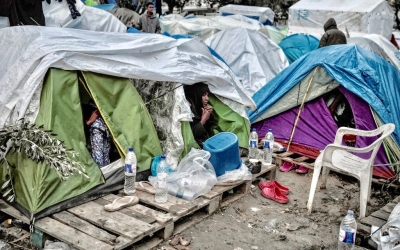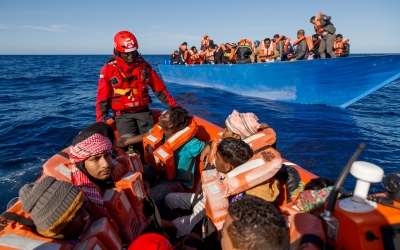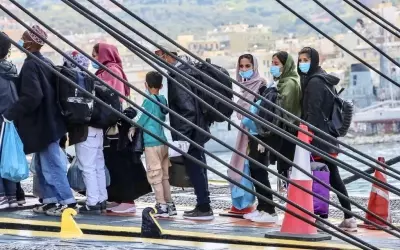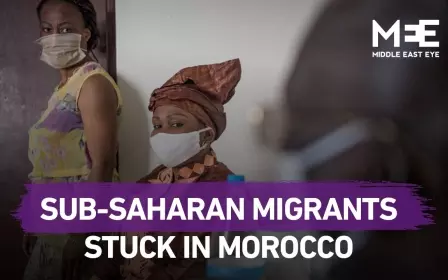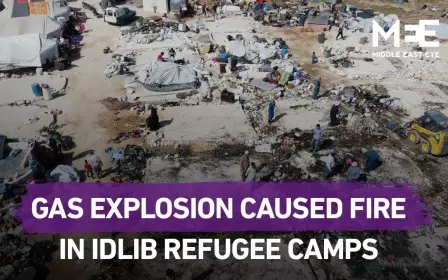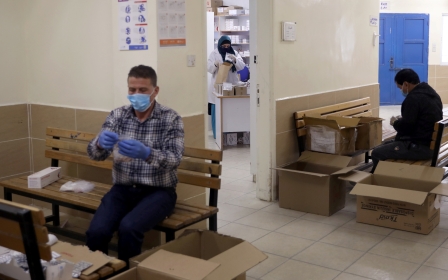Coronavirus: Refugees trapped in Balkans as Europe's borders closed
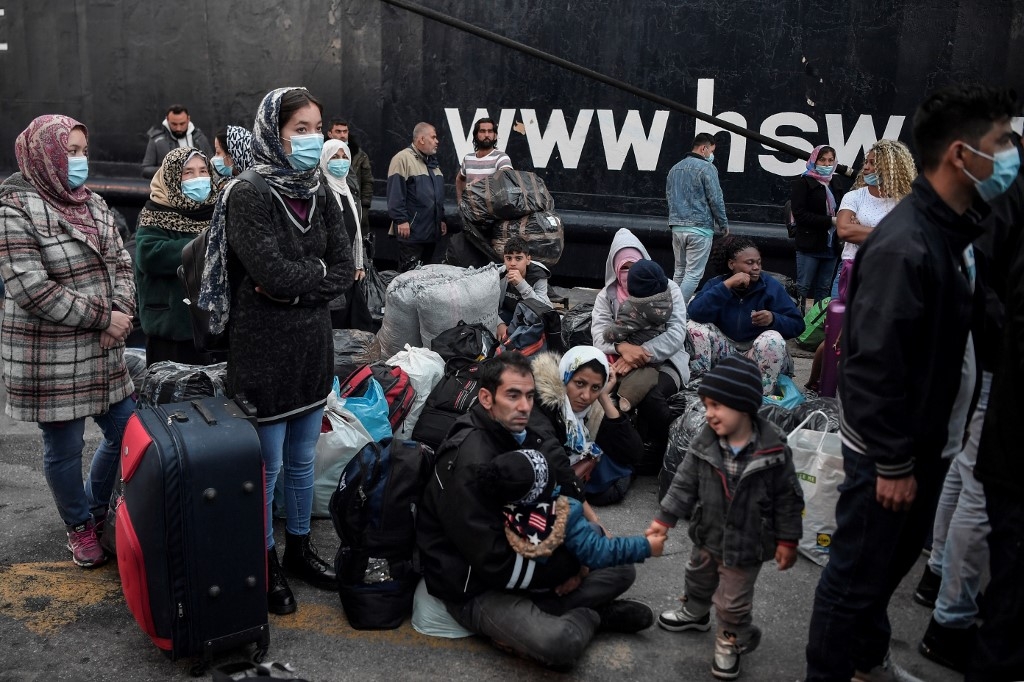
After a long and exhausting wait, Nabil had finally reached mainland Europe, but as the continent grappled with the spread of coronavirus, the Syrian refugee has found himself back to where he started - stranded with little indication of what lies ahead.
The coronavirus pandemic sweeping the globe has forced countries to close their borders, trapping thousands of refugees and migrants on their way to Europe.
'After seven years of trying to make it to Europe to build a new life, I’m exhausted, and now this'
- Nabil, Syrian refugee
The 25-year-old Syrian refugee is currently stuck in a cramped Athens apartment with five other migrants, watching his finances dwindle.
The road to Greece has been long for Nabil.
The young refugee says he was tortured in Syria before eventually fleeing the war to Jordan, where he endured six gruelling years of exploitation.
New MEE newsletter: Jerusalem Dispatch
Sign up to get the latest insights and analysis on Israel-Palestine, alongside Turkey Unpacked and other MEE newsletters
He survived a sinking dinghy during the deadly crossing from Turkey to Lesvos and spent eight months living in a refugee camp. Ahead of the lockdown in March, he finally made it to mainland Europe with a fake passport. But his seven-year journey has been abruptly halted once again.
From Greece, his plan was to cross illegally into Albania and travel through the Western Balkans – a major migratory path – in his attempt to reach central Europe. But like many others, his plans now lie in tatters due to worldwide border closures implemented in a bid to contain the spread of Covid-19.
“The borders had already closed the day we tried to cross so we were forced to return to Athens,” he said.
Nabil now spends his time learning languages and watching television series on Netflix in "a miserable apartment", barely daring to leave the house for fear of being caught and deported, particularly with an increased police presence in the city’s streets.
It is also particularly vital for him to take precautions against Covid-19 to avoid a hospital visit.
Transit countries
Movement through the Western Balkans – typically considered "transit countries" – has ground to a halt, according to humanitarian organisations.
Numbers of new arrivals to southeast Europe dropped by 85 percent last month compared to April 2019, and by 83 percent when compared with March this year, according to Neven Crvenkovic, regional spokesperson for South-Eastern Europe at UN refugee agency UNHCR.
“Without doubt, this is due to varying degrees of restrictive measures introduced since the emergence of the Covid-19 threat,” he told MEE.
Specifically in Bosnia and Herzegovina, which was receiving 700 migrants a week prior to the coronavirus containment measures, weekly arrivals have averaged around 35 people in the last month, according to the International Organisation for Migration (IOM).
In Greece – the frontline of Europe’s refugee crisis – the number of migrant arrivals has dropped dramatically since borders began to close. Throughout April, there were less than 40 arrivals to the Aegean Islands, compared to 1,423 in March and about 1,500 during April 2019, according to UNHCR.
Departures to the mainland have also declined.
In the seven-week period between 23 March and 10 May, 2,192 departures have been recorded – an average of 313 per week. However, almost 2,000 departures were made in the one week prior to this period.
Lockdowns have slowed migrant processing and assistance for asylum seekers, resulting in delays or suspension of asylum procedures, including registration of applications and Refugee Status Determination interviews.
In mid-March, the IOM and UNHCR announced a temporary suspension to their resettlement programme – considered a vital lifeline for vulnerable families – as a result of travel restrictions and health concerns.
In some countries, migrants must remain confined to asylum and reception centres, leading to overcrowding, which makes isolation measures difficult to enforce. Confinement has also led to an increased threat of gender-based violence and risks to child welfare.
Freedom of movement inhibited
Alongside local partners, UNHCR is currently contesting restrictions of movement of asylum-seekers, as well as conditions in the centre, which do not allow residents to follow safety measures, according to Crvenkovic.
Bosnia and Herzegovina eased restrictions for the general population three weeks ago, but migrants still face stringent movement constraints.
To combat the impact of strict curfew measures for 5,200 migrants confined to six asylum centres in Sarajevo and Una Sana in Bosnia, the IOM has organised food deliveries and supervises trips to retrieve money from Western Union.
“We can only transport a small number per day,” said Peter Van Der Auweraert, chief of mission in Bosnia and Herzegovina and coordinator for the Western Balkans, who explained that this means migrants face up to a 10-day wait for access to cash.
“This leads to frustration and, there is also the issue of those people being unable to continue their journey so they are getting anxious. Not being able to go for walks is also creating tension in the centres,” he said.
Van Der Auweraert said that security incidents have seen an increase this month, adding that fasting for Ramadan is an additional strain.
“The restrictions on freedom of movement is certainly something impacting the mental health of the migrants.”
Although migrant numbers have remained stable in most places throughout Bosnia and Herzegovina during the health crisis, with the total standing at between 6,000 to 6,500, counterintuitively, numbers in Bira – an area in the north near the border of Croatia – have decreased by about 1,000, said Van Der Auweraert.
He also predicts an influx of migrants in the coming weeks following the lifting of restrictions in Serbia on Friday, where 9,000 migrants are located across different centres.
Harsh truth
Even when the borders reopen, allowing Nabil to continue his journey, he is concerned smugglers will be offering their services at inflated prices – summer is a peak time for migration and the Covid-19 crisis is likely to mean movement will remain more difficult than normal for those who are crossing borders illegally, resulting in higher costs.
For now, he can only wait, but with no way to earn money and his relatives struggling to offer him any spare cash, his desperation is mounting.
“After paying rent this week I’ll be left with just fifty euros. Hopefully something’s going to change because I don’t want to be homeless here,” he said.
Nabil has even considered handing himself over to the authorities and allowing himself to be deported.
“It’s a very hard time for everyone. I need to stay calm. I don’t want to destroy all the progress I’ve made. I never imagined I would end up in a refugee camp," he said.
"When my family called me I always told them I was staying in a very nice hotel. Even now they don’t know my situation. I’m sure they would be devastated if they knew the truth.
“After seven years of trying to make it to Europe to build a new life, I’m exhausted, and now this."
This article is available in French on Middle East Eye French edition.
Middle East Eye delivers independent and unrivalled coverage and analysis of the Middle East, North Africa and beyond. To learn more about republishing this content and the associated fees, please fill out this form. More about MEE can be found here.


